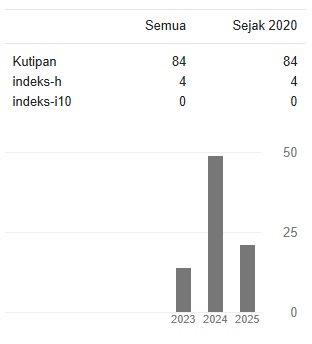Keabsahan Wali Ijbār dalam Perspektif Fikih Islam (Studi Analisis Pendapat Imam Syafi’i)
The Validity of the Guardian of Ijbār in the Perspective of Islamic Jurisprudence (Analytical Study of Imam Shafi'i's Opinions)
DOI:
https://doi.org/10.36701/qiblah.v4i3.2146Keywords:
Guardian of Ijbār, Validity, Islamic Jurisprudence, Imam Shafi'i, MarriageAbstract
This study discusses the validity of the guardian of ijbār in the perspective of Islamic jurisprudence, with a particular focus on the opinion of Imam Shafi'i. A guardian of ijbār is one who has the authority to marry off a woman under his guardianship without her explicit consent, especially if she is a virgin. The objective of this study is to examine the legal foundations and legitimacy of ijbār, as well as the conditions under which it is applicable according to the Shafi'i school of thought. This research is qualitative in nature and employs a library research method, using a normative juridical and philosophical approach. The findings reveal that the concept of ijbār is strongly rooted in the Qur'an and Hadith, and is supported by classical Islamic scholars, particularly Imam Shafi'i through works such as al-Umm. In his view, the right of ijbār is limited only to the father and paternal grandfather, and must meet certain conditions, including the absence of hostility, compatibility of the prospective husband, and a reasonable dowry. This right aims to protect women from poor marriage decisions that may endanger their well-being. However, it must be implemented with consideration of mutual consultation to prevent injustice.
Downloads
References
Abdul Hadi dan Wahyu Fitrianoor. “Hak Ijbar Wali Nikah dalam Tinjauan Sād al-Ẓarīʿah (Studi Perbandingan Ulama Hanafiyah dan Ulama Syafi’iyyah).” Maqashiduna 2, no. 1 (Juni 2024): 40–50.
Abū Dāwūd, Sulaimān ibn al-Ashʿath. Sunan Abī Dāwūd. Juz 2. Beirut: al-Maktabah al-ʿAṣriyyah, n.d.
al-Bayhaqī, Aḥmad ibn al-Ḥusayn. al-Sunan al-Kabīr. Juz 14. Kairo: Markaz Hijrah, 2011.
Atabik, Ahmad, dan Khoridatul Mudhiiah. “Pernikahan dan Hikmahnya Perspektif Hukum Islam.” Yudisia 5, no. 2 (Desember 2014): 286–316.
al-Dāraquṭnī, ʿAlī ibn ʿUmar ibn Aḥmad. Sunan al-Dāraquṭnī. Juz 4. Beirut: Muʾassasah al-Risālah, 2004.
al-Dimyāṭhī, Abū Bakr ʿUthmān ibn Muḥammad Syāṭhā. Iʿānat al-Ṭālibīn ʿAlā Ḥalli Alfāẓ Fatḥ al-Muʿīn. Juz 3. Beirut: Dār al-Fikr, 1997.
al-Hayati, Kamil. Solusi Islam dalam Konflik Rumah Tangga. Diterjemahkan oleh Noor Hasanuddin. Jakarta: Raja Grafindo Persada, 2005.
Ibn Mājah, Abū ʿAbdillāh Muḥammad ibn Yazīd. Sunan Ibn Mājah. Juz 3. Beirut: Dār al-Risālah al-ʿĀlamiyyah, 2009.
Ibn Rushd. Bidāyatul Mujtahid wa Nihāyatul Muqtasid. Juz 1. Kairo: Dār Ibn al-Jauzī, 2014.
Kementerian Agama Republik Indonesia. Al-Hikmah Al-Qur’an dan Terjemahannya. Bandung: CV Penerbit Diponegoro, 2010.
Khayyul Millati Waddin, Moch. Aufal Hadliq, dan Ridwan Yunus. “Relevansi Hak Ijbar Wali Nikah (Studi Pemikiran Wahbah Az-Zuhaili dalam Fiqih Islam wa Adillatuhu) dan Kompilasi Hukum Islam (KHI).” Mabahits 3, no. 2 (2022): 110–123.
Muslim ibn al-Ḥajjāj al-Naysābūrī. Ṣaḥīḥ Muslim. Juz 2. Kairo: Maṭbaʿah Fuʾād, 1955.
Noor, Juliansyah. Metodologi Penelitian. Jakarta: Kencana Prenada Media Grup, 2011.
Pransiska, Toni. “Meneropong Wajah Studi Islam dalam Kacamata Filsafat: Sebuah Pendekatan Alternatif.” Intizar 23, no. 1 (2017): 167–180.
al-Ṣabūnī, Muḥammad ʿAlī. Rawāʾiʿ al-Bayān Tafsīr Āyāt al-Aḥkām min al-Qurʾān. Juz 1. Jakarta: Dār al-ʿĀlamiyyah, 2015.
al-Shāfiʿī, Abū ʿAbdillāh Muḥammad ibn Idrīs. al-Umm. Juz 5. Beirut: Dār al-Fikr, 1983.
Sujarweni, Wiratna. Metodologi Penelitian. Yogyakarta: Pustaka Baru Press, 2019.
al-Tirmiżī, Muḥammad ibn ʿĪsā. Sunan al-Tirmiżī. Juz 1. Beirut: Dār al-Garb al-Islāmī, 1996.
al-Zuḥaylī, Wahbah. al-Fiqh al-Islāmī wa Adillatuhu. Juz 9. Damaskus: Dār al-Fikr, 2007.



 FOCUS AND SCOPE
FOCUS AND SCOPE EDITORIAL TEAM
EDITORIAL TEAM












